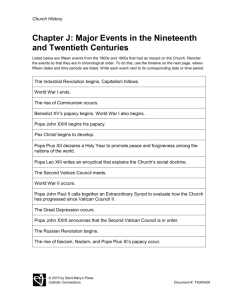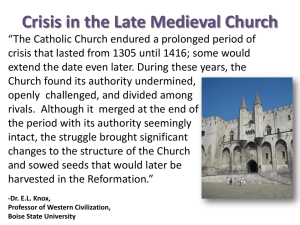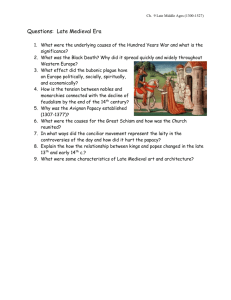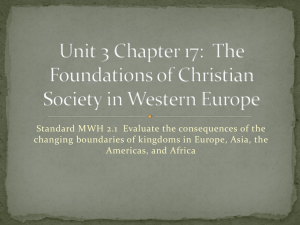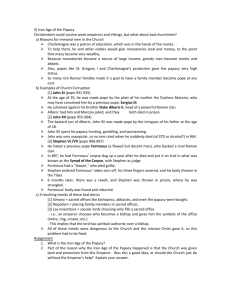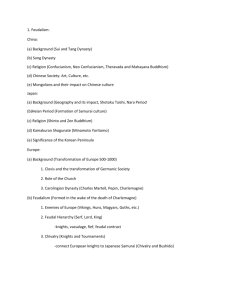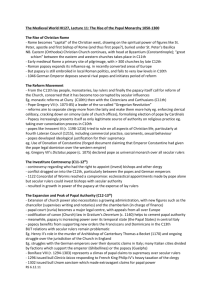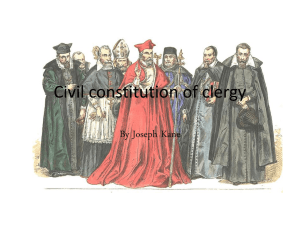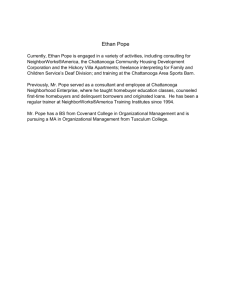more the conciliarist - The Center for Thomas More Studies
advertisement
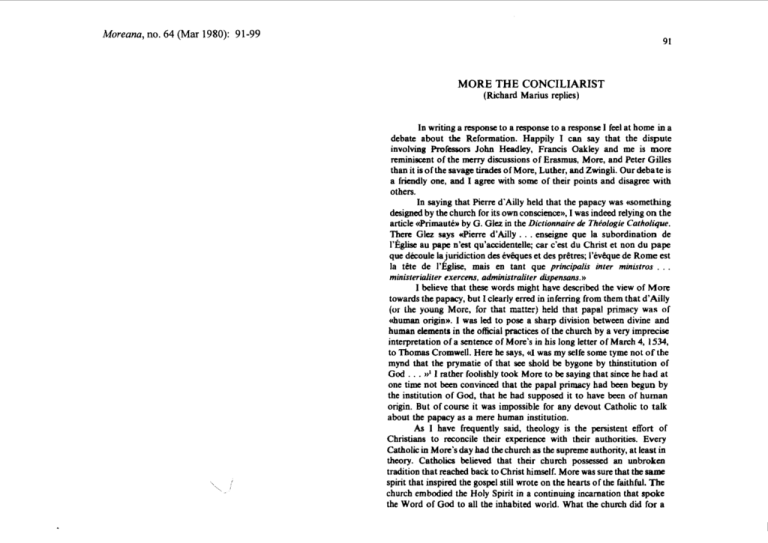
Moreana, no. 64 (Mar 1980): 9 1-99 MORE THE CONCILIARIST (Richard Marius replies) In writing a response to a response to a response I feel at home in a debate about the Reformation. Happily I can say that the dispute involving Professors John Headley, Francis Oakley and me is more reminiscent of the merry discussions of Erasmus, More, and Peter Gilles than it is of the savage tirades of More, Luther, and Zwingli. Our debate is a friendly one, and I agree with some of their points and disagree with others. In saying that Pierre d'Ailly held that the papacy was (something designed by the church for its own conscience)),I was indeed relying o n the article <<Primauteuby G. G l u in the Dictionnuire de Theologie Catholique. There Glez says eierre d'Ailly . . . enseigne que la subordination de I'E+ au pape n'est qu'accidentelle; car c'est du Christ et non du pape que dkcoule la juridiction des e w u e s et des prt?tres; I'hQue de Rome est la tEte de l7kglise, mais en tant que principalis inter ministros . . . ministerialiter exercens, administraliter dlFpensons.n I believe that these words might have described the view of More towards the papacy, but I clearly erred in infemng from them that d'Ailly (or 'hc young ? - o ~ cfoi , hi?matk:) held *tit papa! p~Lmacywas of (human originn. I was led to pose a sharp division between divine and human elements in the official practices of the church by a very imprecise interpretation of a sentence of More's in his long letter of March 4, 1534, to Thomas Cromwell. Here he says, ccI was my selfe some tyme not of the mynd that the prymatie of that see &old be bygone by thinstitution of God . . . n1 1 rather foolishly took More to be saying that since he had at one time not been convinced that the papal primacy had been begun by the institution of God, that he had supposed it to have been of human origin. But of course it was impossible for any devout Catholic to talk about the papacy as a mere human institution. As I have frequently said, theology is the persistent effort of Christians to reconcile their experience with their authorities. Every Catholic in More's day had the church as the supreme authority, at least in theory. Catholics believed that their church possessed an unbroken tradition that reached back to Christ himself. More was sure that the same spirit that inspired the gospel still wrote on the hearts of the faithful. The church embodied the Holy Spirit in a continuing incarnation that spoke the Word of God to all the inhabited world. What the church did for a 92 MORE THE CONCILIARIST RICHARD MARIUS long time was valid merely because the church did it, for if God had wanted things otherwise, the Holy Spirit would have inspired a change. But at least as far back as Gratian there had been a canonical distinction made between necessary law and convenient law. Both came from God. The necessary laws included some things like the office of priesthood destined to remain in the church to the end of time. The laws made for convenience included such things as the prohibition of marriage within certain degrees of kinship. These rules could be changed to meet the changing needs of different ages. Under perplexing circumstances like the ((BabylonianCaptivity)) at Avignon and the Great Schism, some might come to think that the papal primacy had been set in the church for a time but that now a change was in order. And with the gross immorality of the political popes of the Renaissance, such thoughts might be revived. I have shown that More was willing to entertain without branding it as heresy the suggestion that the church could d o without the pope alt~gether.~ And in his letter to Cromwell he remembers this old thought when he says that he cannot see (what the question could avayle whither the prymacie were instituted immediately by God or ordeyned by the Chirch.)) The question avails nothing, he says, because the pope is the common head of the church, and no member can depart from the head without the consent of the whole body.3 But this is to argue simply that a single man or a single nation cannot forsake the papacy without the consent of the whole church; it is not to argue that such consent will be forever denied. The tenor of all More's remarks on the question in this letter is that such things must he decided by the general council. And here was the heart of the matter. Tradition had sanctified both pope and councils. It was almost impossible for the devout to suggest that such important institutions might have run their course and that either was ready for extinction. Both were essential parts of the experience of the church, and somehow both had to be reconciled with the church's authorities-scripture and the tradition that embodied scripture. We may think that conciliar theorists would have had an easier time of it had they been willing to junk the papacy altogether. But once we drop Marsilius of Padua, as Oakley rightly says we should, who was there to suggest that the church could do without the pope? Such a solution to the papal problem would have put an intolerable stress on the church's historical authority. Even the doctors at Constance never proposed to abandon the papacy. They only wanted to control it, to discipline the popes. And such, I think, was More's position. My friendly adversaries persist in writing as if I had said that if f I 1 i 1 i 93 More was a conciliarist, he had to reduce the papacy to nothing. But the real problem of the conciliarist was to define precisely what the relation between pope and council should be, not to cancel the relation by destroying the papal office. The clear sense of the decrees Sacrosancra and Freqwns of Constance was that general councils should frequently review what the pope was doing, correct his errors, and depose him if necessary. So Oakley rightly defines the conciliar movement as holding that a general council could act (alone without that head or even in opposition to him.)) But he cannot mean that conciliarists wanted to be rid of the papacy! Rather they proposed that the council was sovereign in the church. In emergency situations such as heresy or schism or even grave unrest in the church, they expected a council to cast out a bad pope and to install a good one and between popes to rule the church by itself. Brian Tierney pointed out long ago that the canonical basis for the conciliar movement was Dist. 40, c. 6. Here, though the pope's authority was extolled in sycophantic hyperbole, the canon provided that a pope might be judged ((fordeviant faith)).Conciliarists interpreted this canon to mean that a council could remove a pope for heresy. The radicalism of the conciliarists of Constance was grounded in their willingness to extend the definition of heresy to include schism, immorality, or anythmg else that injured the church. More seems more radical than most when he declares that a pope could be removed for (<incorrigible mynde and lacke of amendement)) without in any way suggesting that these vicesbe c0nncr;i.d to traditional definitions of h e r e ~ y .If~ a pope had to be removed, the experience of the church at Constance had shown that the general council had to do the removing unless someone wanted to return to the bad, old imperial days of the Carolingians, the Ottonians, or the Hohenstaufen. Oakley seems to be saying that when a loyal Catholic like More mentioned the council, we must ((surely))infer that he included the pope in the same way that my promise to attend the next meeting of More editors implies a commitment to bring my head with me. Here indeed I must confess to my habitual vice of triumphal flourishing. For in my experience people use words like (surely))and cccertainly))when they are not sure or certain at all. In rhetoric these are always adverbs that assert conclusions that cannot be unquestionably established from the evidence. They assume doubt and express intuition. They are the genteel equivalent t o the note discovered in the margin of a sermon manuscript of a Puritan preacher: (Argument weak here; shout like hell.)) Even a conciliarist would speak of councils as if they included the pope in any discussion where the relation between pope and council was I 94 RICHARD MARIUS 1 E MORE THE CONCZLZARIST 95 i not in debate. Popes generally presided over councils. But the history of the church shows that for different Catholics, either pope or council has weighed more heavily in the scales of value. My contention is simply that for More the council had much more authority than the pope. Conciliarists and papalists disagreed on the right of appeal from the judgments of a pope to the decision of a future council. Martin V, the pope chosen at Constance, almost immediately ruled in a Polish case that no appeal from a pope to a future council was possible, a position made formal by Pius I1 in his vehement Execrabilis of January 28, 1460. But by 1460 the conciliar movement had lost its vigor. Still, those who recalled Constance and loved the church and yearned for reform might well speculate on a conciliar revival that would make good the failures of the papacy. Churchmen, like generals, are always preparing for the last war. The conciliar movement was directed against the churchly troubles of the fourteenth century. But as it turned out, the shock that jolted the church with Luther was not schism led by rival popes. It was heresy and heresy of an ancient and perdurable sort. The decrees of Constance had nothing special to say about a Luther. The church quite naturally treated the Lutheran affair as a case of heresy according to traditional usage-remonstrance with the heretic, a demand that he recant. a threat of excommunication and a summons to Rome, followed by excommunication itself. And yet the old usage failed to dam the flood. In this sudden and terrible tidal wave, conciliarists and papalists alike found themselves swimming for their lives, struggling to hold on to an ancient understanding of the church that seemed about to be swept away. Conciliarists and papalists alike agreed at Constance that John Hus should be burned; a century afterwards their spiritual heirs were equally agreed that Martin Luther was a limb of the devil. Oakley tells us that (when More fails to indicate otherwise,)) we must suppose that he always thought of pope and council together. He fails to see that More had a great interest in not being explicit about the conciliar issue at all. The papacy became the Catholic Verdun. Even conciliarists were compelled to defend the papacy just because the heretics wished to destroy it. Conciliarists might well have chosen a place where the terrain suited them better. More did his best to shift the battlefiekl to a consideration of the authority of the common corps of Christend~m.~ But in the end the papacy had to be defended simply because the fury of the Protestant assault fell against it. We would expect a devoted conciliarist to be quiet about his i 1 L ; / i dispute with papalists when Luther attacked the church all Catholics loved. One does not stand on the deck debating conciliarism when the ship has been torpedoed. One rushes to the hole and begins to fight back the sea. Conciliarists writing against the heretics could not berate the wickedness of popes while Luther, Zwingli, and the rest were pouring bombast on the papacy-though More comes stunningly close to doing just that in his remarkable comment in the Responsio that Luther's advent might prove of great benefit to the papal see!6 (Erasmus went right on condemning everybody, but no one can say he was typical of Catholic foes o f Martin Luther!) Let Headley and Oakley try to imagine a way of unequivocally upholding the conciliar position when More wrote against Luther; let them see how ineffectual such a divided argument would be in a fight to the death against all those fanatics intoxicated with their certainties. The most inexperienced reader in Lincoln's Inn would have known better than to make such a divided plea to any judge. And More would never have made such an ambiguous argument before the arbiter of this case, the general public of England and Europe, whose enthusiasms he inherently mistrusted. ((Yes, I agree with Martin Luther; the pope has too much power in the church. Let's restrain him with the general council!)) With what glee would the heretics have flaunted such an admission by one of the church's greatest defenders! I never dreamed ihai More opposed pope and coiiiici: in siich a way that one must extinguish the other. But I do believe that he always exalted the council over the pope and that this mood is clear in his writing. We must account for all those occasions in his voluminous works when we might expect him to say something about papal power and are met instead by screaming silence. Did he keep quiet about the papacy merely t o avoid offending Henry VIII? Nonsense. Henry's dispute with the papacy did not become acute until after Wolsey's fall in 1529, and in nothing More wrote in Latin or in English before that time can we find More making papal sovereignty an article of the faith. And here it is that I have my real debate with my good friends. They refuse to pick up some of the pieces of the puzzle that lie scattered at their feet. When he edited the Responsio Headley was commendably ((baffledby More's unwillingness, voir CW 5, 772 in the period before the king's 'Great Matter' developed, to discuss the papacy.)) He said then, ((More's evasiveness is bewildering.))' But in 1974 when he replied to my criticism of his views, he seemed to have lost all this healthful earlier bafflement over More's reluctance to discuss the papacy at any time. Now Headley seemed to say that if More believed that the papacy had been 96 RICHARD MARIUS divinely ordained, he could not have been a conciliarist-a view that would have puzzled Gerson and d ' A i l l ~ . ~ As Oakley has so well demonstrated, d'Ailly and Gerson (whom More revered) believed that God did ordain the papacy in the churchbut a papacy restrained continually by the sovereign general council. And when Headley, commenting on my ((labored criticism)) of his essay admonished me that i t would be a considerable disservice to suggest that the conciliar comes to displace or supplant the papal element in More's understanding of the church,)) I could only nod in approval. But his comment misses my point. The distinction of functions is the real issue. And I have shown that whenever More speaks of pope and council he always tends to exalt the council and to be altogether vague about the pope's authority. Now comes Oakley riding like a good soldier towards the sound of battle, flourishing his pen. He tells me that More's habitual exaltation of the council includes an exaltation of the papacy because the pope is part of the council. When I lift my glass to the light, I raise also the wine in the glass. This argument has a certain elegance, but it is not strong. For I find it puzzling, if Oakley is right, that when More treats the great papal proof-texts of the New Testament, he avoids their historic interpretations as he might have shunned a leper's kiss. Matt. 18: 16- 18 is always for him only a promise that the church will prevail against the gates of hell. In aii his Engiish works he ig~ioresthe papalis: contenti~n that the power of binding and loosing, given by Christ to Peter, has passed to Peter's successors, the popes. Only in the Responsio when Luther has shaken the papalist interpretation under his nose will More take fleeting note of it. But even in the ((H gathering)) of this book, he touches this matter gingerly, like a woman touching a hot stove in an unfamiliar house. He rushes from it to a discussion of sin in the church and argues his certainty that the church will never be destroyed by its enemies. His studied vehemence here is so great that one may easily fail to see how slightly he has treated the papal power.1° I think he planned it that way. More made only three points about the papacy in the Responsio; any of them might have been made by a conciliarist. The popes are the successors of Peter. A solitary rebel like Luther has no right to dispute the legitimate commands of a pope. Obedience to the papacy is one of the signs of a church well known to all Christians and not invisible as Luther claimed the true church must be. What he carefully left undefined was the nature of the pope's authority and the precise requirements of Christian obedience to the Bishop of Rome. Some explanation must be given for More's silence, but Oakley has MORE THE CONCILIARIST 97 neither provided one nor pointed us in a direction where one might be found. Two points remain. What d o we make of More's comments on pope and council in that letter to Cromwell? And what means his statement that when he was writing the Conjutation he wrote at length on the papacy but c(suppressed it vtterly)) when he saw the displeasure he might cause?12 I cannot see how More's assertion that a future council might depose the pope can be taken in any but a conciliar spirit. I cannot imagine such a thought from a devoted papalist like John Fisher. As Oakley has shown in an excellent article, Cajetan had to contrive an extremely complicated argument when he wished to show how a council could depose a pope, even when the pope was a heretic.13 Cajetan was a papalist, but he had to give some place to the pope. Cajetan found the matter extremely difficult. But here is Thomas More suggesting that a future council might depose the present pope and install another more suitable t o Henry's needs and all without the whisper of a suggestion that he suspected poor, blundering, hapless Clement VII to be guilty of heresy! Unless we suppose that More assumed the right of a council to depose a pope for any reason necessary for the good of the church, his statement to Cromwell makes no sense at all. And @ace Oakley) we must assume that a council, having depsd a woii:d the ch-uich at least fGi a wiil'loiii the pope until, as Constance did, it could see to the election of another. So More possessed all the beliefs that by Oakley's own definition would have made a man a conciliarist. Henry had just appealed to a future general council against a pope. More evidently did not take such an appeal to be the <(pestiferous position)) Pius I1 said it was.14 I cannot imagine a John Fisher, a Cajetan, a John Eck, or a John Cochlaeus taking such an attitude towards Henry's fleeting hope that a council might do him good. With regard to More's assertion that he had suppressed a discussion of the papacy in the Confutation, I must say that Headley plucks a reed and waves it like a lance. ((By these very suppressions and lacunae,)) he writes, d h e idea of obedience to Rome is reflected and its importance evident.))' But in fact, as Henry VIII must have realized during his brief flirtation with conciliar ideas, the prospect of a general council offered him small consolation. Churchmen would assemble somewhere other than England, and only a few of them would be English. A pope would preside. And if Clement VII should be deposed, there was no assurance a t all that 98 RICHARD MARIUS another pope would look with more favor on Henry's lusts and longings. And if the council did not depose the pope, Henry would have been left with a wife who could not bear children and would not retire gracefully to the convent. More could read these matters well enough. To spell out the relation between pope and council might have dismayed Henry enough to drive him utterly from vague conciliar notions afloat in his vicious mind even as More's Confutation was making its two-part exit from the press. More saw Henry's hopes for a council as the last, thin cords tying him to the universal church of Christendom. And we recall More's words to Cromwell as Roper remembered them years later: If you will follow my poor advice, you shall, in your counsel-giving unto his grace, ever tell him what he ought to do but never what he is able to do. So shall you show yourself a true faithful servant and a right worthy counsellor. For if a lion knew its own strength, hard were it for any man to rule him.'" More's irony appears in the letter to Cromwell when he recalls that Henry was once a much greater protagonist of the papal power than he was himself. His irony is also to be found in his statement that he suppressed any discussion of the papacy in the Confirration lest he iimedle in that mater agaynst the Kyngis gracious pleasure, what so ever myn awne opinion were therin.3' He does not teii Cromweii in &tail what he would have said about the papacy; and he does not tell Headky or Oakley either. We can see that for him to discuss the papacy would have required discussion of the council, and there was simply no way that More could turn a defence of the general council into an asset for his own cause. I rather think that when More begged his king, through Cromwell, not to deny the authority of the general council he was doing two things. He was asserting his own conviction that the general council was sovereign in the church and that in extreme cases the council could judge the pope and govern the church by itself even to the point of giving the church a new constitution. But he was also making an ancient response of diplomats with their backs to the wall. He was playing for time. He knew that a council could not really help his king. But to reveal that fact to Henry would only be to show the lion his strength. Frustrated at every hand, Henry would go his own way and take his people with him, and he would get away with what he did. But in time who could tell what might happen? Catherine might die. Henry might die. By some miracle the world might change, and More's beloved England might be saved for More's beloved church. MORE THE CONCILIA RIST 99 As my friendly adversaries agree, the unity of the body of Christ was far more important to Thomas More than the place of the pope in the Church. A papalist-like John Fisher-had every reason to be thumpingly direct concerning the power and the authority of popes. But a conciliarist like More had every reason to be vague if that vagueness might contribute to the salvation of the church. And so he was. Cambridge, Massachusetts Richard C. Marius NOTE 1. E.F. Rogers, The Correspondence of Sir T h o m More, Princeton, 1947 (hcncc- forth called Rogers), p. 498. 2. C W 8 , 1301-02. 3. Rogers, pp. 498-9. 4. CW 8, 1305-6. 5. CW 8, 1301. 6. CW 5, 142-3. 7. C W 5 , 772. 8. Moreana 41, 5-10. 9. Ibid., p. 9. 10. CW 5, 116-211. 11. CW 8, 1303. 12. Rogers, p. 5001279. 13. American Hhtorical Review 70, 673-6. 14. Denzinger-Schonmeizcr, 1965. 345. IS. Moream 41, 8. 16. Roper's Li/e of More, EETS (1935), pp. 56-57. 17. Rogers, p. 500, line 282.
